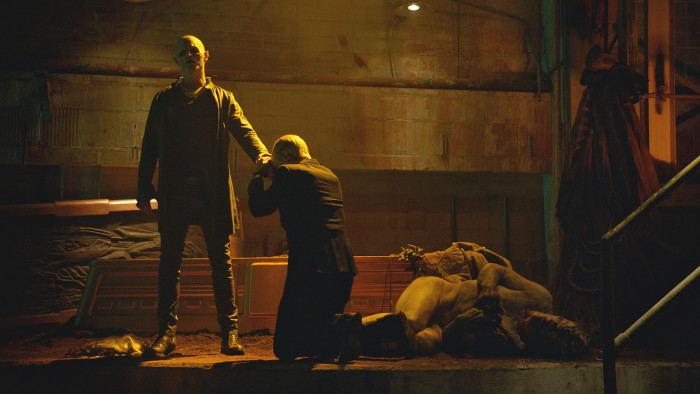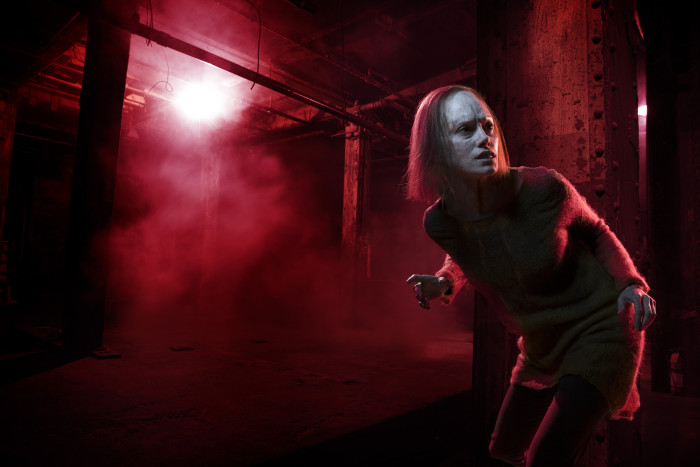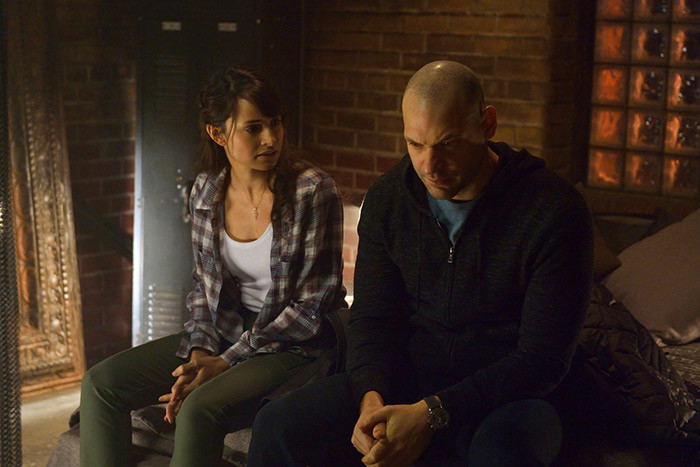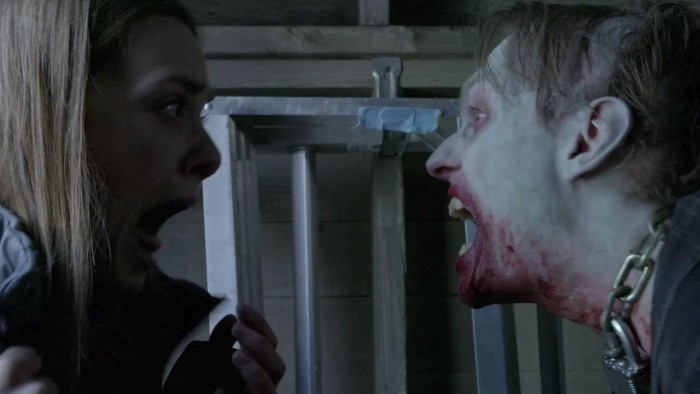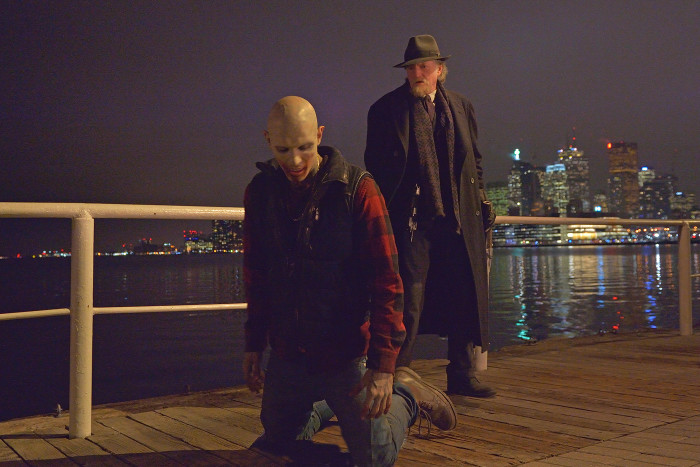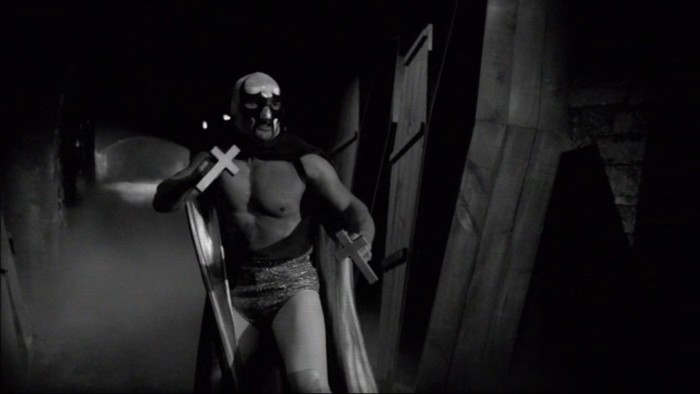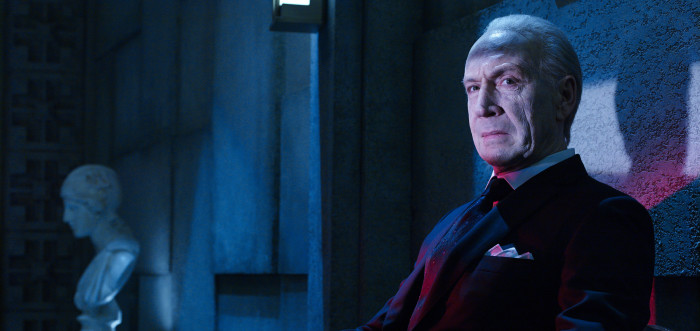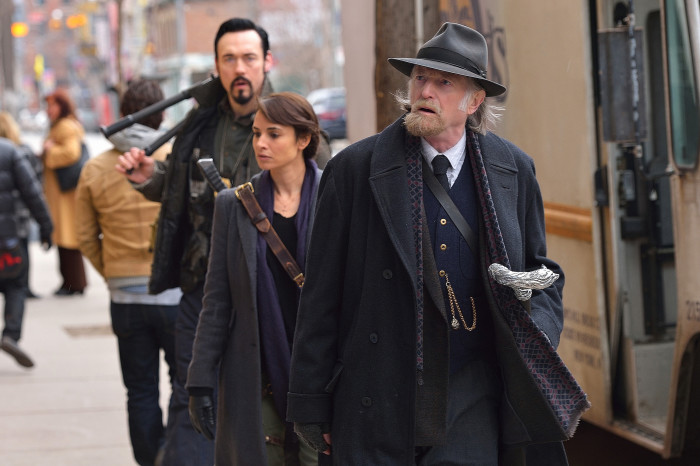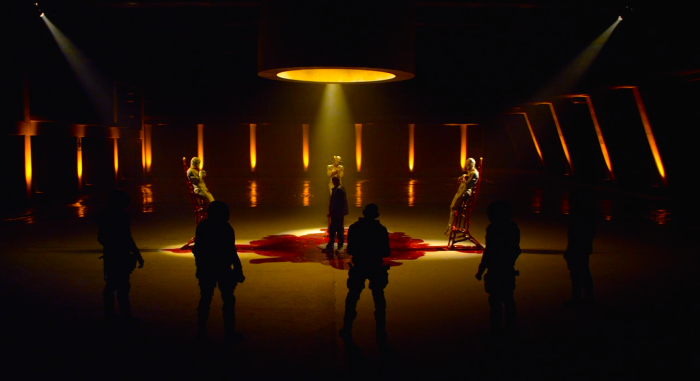Praising (And Criticizing) 'The Strain' On The Eve Of Its Final Season
This Sunday, The Strain heads into its fourth and final season. Created by Guillermo del Toro and Chuck Hogan, it's a horror drama with enviable pedigree and made waves at the time of its premiere in 2014 with its unsettling ad campaign (most of the promo images for the first season featured a worm making its way into an unfortunate victim's eye, which was eventually taken out of circulation due to complaints) and its new take on vampires. Since then, the show — much like the vampires on it — has mutated and changed. This has been equal parts good and bad news; the show's inconsistencies haven't really been ironed out, but the heights it reaches make up for the valleys.Spoilers for the first three seasons of The Strain follow.
Strigoi Fever
The vampires on The Strain are known as strigoi. They're parasites rather than paramours as they so commonly are in pop culture. Like their popular counterparts, strigoi can't venture into sunlight, and are particularly affected by silver, but it's there that the similarities end. The strigoi are just as novel as they are disgusting. As suggested by the ads, they proliferate via a type of capillary worm, and infection results in truly horrific changes that are cataloged throughout the show. The tongue turns into a proboscis, and hair, nails, and genitals (among other things) all fall off. Strigoi are also relatively mindless creatures, controlled by appetite and by hivemind rather than any autonomous thought. Granted, there are a few exceptions to the rule.
It’s Good Being Bad
The big bad of The Strain is an ancient vampire known only as the Master. Over the course of the show, he's survived in classic parasitic fashion, i.e. by taking on new hosts rather than remaining in a single body. In his quest to take over the world, he's chosen lieutenants — strigoi he allows a measure of autonomy and who pass for human with the use of makeup and prosthetics. His most prominent henchman is Thomas Eichhorst (Richard Sammel), who is consistently one of the most compelling parts of the show. This largely has to do with Sammel's performance, which outshines the sometimes-dull material he's given. His back-story as a former Nazi is rote, as is his role as the perpetual metaphorical bridesmaid, but it works due to how unafraid Sammel seems to be of being despised. And what fun is a story without a good villain?
Mommy Dearest
The Master's second lieutenant comes in the form of Kelly Goodweather (Natalie Brown), the ex-wife of protagonist Ephraim "Eph" Goodweather (Corey Stoll). The series opens as they're going through their divorce, and Kelly turns before the first season is through. It's a storyline that's only become more and more compelling as Eph (who was unwilling to go through with the divorce) has to reckon with the loss of his wife as well as the questions from his son, Zach (Ben Hyland in the first season and Max Charles thereafter), as to what's happened to her. Ultimately, Zach ends up in Kelly's hands, and it's been a delight watching Natalie Brown play the conflict between human and strigoi nature as Kelly struggles between the protective instinct she still harbors for her son and the need both to feed and to follow the Master's plan, which doesn't really account for Zach's wellbeing.
Beyond Thunderdome
One of the most interesting things about The Strain has been how ineffective its hero is. Eph is well-intentioned, but he's shown to fail time and time again, to the point that his storyline feels Mad Max-ish in how he seems to lose each and every person who matters to him. Each loss takes its toll, too, as the show has seen him descend into alcoholism and a certain amount of self-pity rather than necessarily bucking up and getting through it. Again, it's a gambit that works in large part due to the actor in the role (in this case, Corey Stoll, who manages to project a certain amount of strength and charisma despite how badly Eph is falling apart). Eph is sympathetic because he does about as well — if not better — than any of us might were we in his shoes. Dealing with the end of the world isn't exactly easy, especially when those you love are working against you.
Women at the End of the World
Of the female characters, Kelly probably fares best. The hacker Dutch Velders (Ruta Gedmintas) kicks ass, but suffers for having her storyline tied largely to her love interests rather than her own merits. Nora Martinez (Mia Maestro), Eph's colleague at the CDC and some-time flame, doesn't fare much better, as she serves as a source of conflict for Eph before ultimately being fridged to further his existential angst. The tough councilwoman introduced in the second season (played by Samantha Mathis) doesn't even make it all the way through the third. This isn't to knock any of their performances — the cast of The Strain is fantastic across the board — but it points to a larger problem within the show, i.e. its large cast, while allowing for strange archetypes that normally wouldn't get any screen time, also means that other stories get cut a little short.
New York, New York
There are a seemingly infinite number of characters on The Strain. It helps insomuch as it ramps up the sense that anyone could be killed or turned at any moment, but it does mean that the ways in which the plotlines diverge and then reconnect can meander a little before getting to the point. While the main action takes place in New York City, the show also wanders off to Europe in flashbacks that detail the Master's origin, as well as the source of the grudge between Eichhorst and Abraham Setrakian (David Bradley, and Jim Watson in flashbacks), an old man who encountered Eichhorst during the second World War and has been fighting the strigoi ever since. The show also traverses Brooklyn and Staten Island, though they're locations that are mostly checked by name, only, rather than any geographic accuracy (which, admittedly, would be difficult given that the show mostly shoots in Toronto, though there is a truly insane stand-in shot for Coney Island). That said, all that roaming does provide the show with one of its other biggest assets: a certain amount of diversity.
The Silver Angel
The most striking character on the show thus far has been Angel Guzman Hertado (Joaquin Cosio), a retired luchador once known as "The Silver Angel." Guillermo del Toro himself directed the black-and-white bit that serves as his introduction, a mini-movie that pits wrestler against vampire. The sequence is gorgeously shot, especially as the wrestler pulls out silver crosses that serve as brass knuckles, and it's an image that recurs in Angel's final moments on the show. He sacrifices himself to save Gus Elizalde (Miguel Gomez), and in his final moment, as he stands atop a vehicle that bursts into flames, there's a brief flash of him in his luchador costume once again, restored to his former glory. Angel is singular on the show in theme (in present day, he walks with a limp he acquired while shooting the movie we see, and in a mirroring incident, he's bitten in the leg by a strigoi shortly before his death) and in execution (Gus is a bit of a caricature and a stereotype in comparison, as has been pointed out by some critics of the show, though the character is mostly saved by Gomez's performance), and while he seems a little disparate as a result, he's no less compelling.
How to Succeed in Business
Eldritch Palmer (Jonathan Hyde), on the other hand, is a bit of a wild card in terms of how well he works within the structure of the show. Hyde is superlative, but can't quite manage to right the ship. Eldritch is introduced to us as a secondary antagonist working in concert with the Master, as he uses his considerable wealth to further the Master's aims in the hopes that the Master will grant him immortality. His storyline took a turn during the second season as he fell into a love affair with his personal assistant, Coco (Lizzie Brochere), who, much like Nora, was ultimately a way of setting another plot point into motion. In this case, it was to turn Eldritch against the Master, as the Master slaughtered Coco after getting some pushback from Eldritch on his upcoming plans. The resulting subterfuge has been interesting to watch — much like Eichhorst, he has some history with Setrakian and begins working with him after Coco's death — but Palmer just isn't quite as strong a presence as Eichhorst or Angel. That said, the third season ended with the Master taking over his body; the shake-up ought to make things a little more interesting.
The Dynamic Duo
Setrakian, meanwhile, has a solid presence on the show as an extremely atypical hero. His narrative positions him more in the hero's role than Eph, as he's been fighting the Master for almost a century now, and is better versed in the lore. Though he teams up with Eph, more of his story is spent with Vasiliy Fet (Kevin Durand), an exterminator and Dutch's on-again, off-again flame, as a strange but charming dynamic duo, as Vasiliy is a bit of a nut when it comes to killing strigoi and Setrakian, as an old man, is far from the typical action hero. In other words, they're ill-matched in everything but determination and abrasive attitude, and it's a nice change of pace in a show that can sometimes seem like it plays a little too by-the-numbers. Their partnership has also worked in terms of their own character development, as learning more about the strigoi has put Fet in a position to take on more responsibility (which he generally shirked upon his introduction on the show), and has given Setrakian more of a chance to get into trouble.
Person to Person
The biggest problem that The Strain has is in balancing its overarching melodrama (ancient vampire must be stopped from infecting the Earth's population) with the interpersonal drama playing out between its characters (Kelly's relationship with her son, Angel's connection to his past, etc.). The third season threw down a bit of a gauntlet by ending with looked like the beginning of the apocalypse. It's a move that suggests that the final season will be pushing both envelopes to the limit, hopefully for the better. The show's best moments reach sublimity but can't be completely reconciled with how much other parts of it can drag; given how good it can be, it'd be a pity for the show to go out with a whimper rather than a bang. As is the case with most of the characters on the show, it deserves some kind of redemption.

